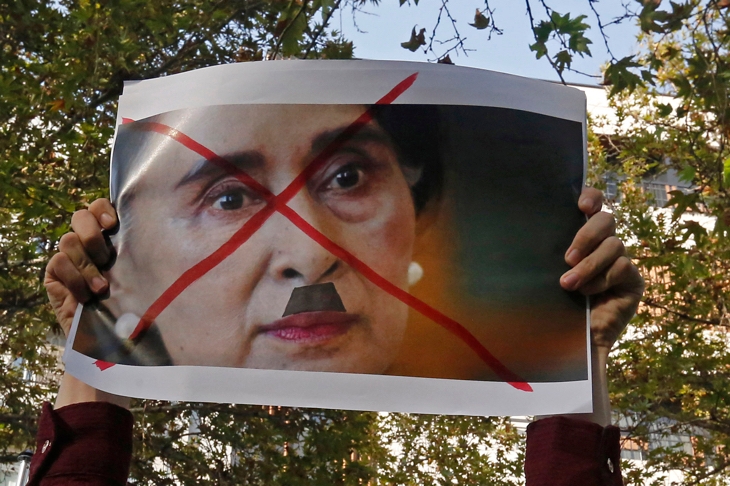With all the wrath of a lover slighted, the Left has turned on Aung San Suu Kyi. On Friday, Jeremy Hardy, Marxism’s comedy mouthpiece, lambasted her as a ‘racist, vain narcissist’, while a petulant George Monbiot demanded that the woman be stripped of her Nobel peace prize. ‘To Aung San Suu Kyi we entrusted our hopes,’ he complained in a column last week, lamenting that he and his activist friends now feel ‘cruelly betrayed’. The heart bleeds.
How things have changed. Until recently, Suu was an icon of human rights, enthroned in the pantheon with Mandela, Gandhi and the Dalai Lama. Now, if the bien pensant are to be believed, she’s a racist.
My great-grandmother was Burmese. Although I have never met Suu personally, I know a number of her close friends and extended family. They have always described Suu as a dizzyingly beautiful, charming, headstrong and fiercely independent woman, who was known to have climbed over the wall of her Oxford college when staying out past bedtime, and took that same attitude with her into the monumental challenges of her later life.
They also recall her fondness for the military. After all, her father, Aung San, was a warrior cut down in his prime, and for a good part of Suu’s childhood, soldiers were a big part of her life.
Throughout her incarceration, the fetishisation of the Lady of Burma sat slightly uncomfortably with people who knew her. Not that they didn’t greatly love, admire and support her, you understand; but it was odd for them to see a friend, however gifted and principled, being used to fulfil an Occidental need for an Oriental saint.
Suu has always been an exceptional person, but she has never been without her faults. The way she placed her children very much in second place to her country created deep resentments in her personal life, and her single-minded brashness could sometimes be controversial.
These traits in general, and her love for the military in particular, were incompatible with the Left’s idealised view of her. So they simply airbrushed them out. And because she was under house arrest, their idolatrous vision of saintly womanhood was never forced to square with the flesh-and-blood person on whom it had been pinned.
It is a familiar dynamic. The fact that the Dalai Lama, for instance, demands the oppression of a Tibetan minority and has admitted to shooting birds with an airgun does not stop right-on Westerners from going weak at the knees when he giggles. Likewise Desmond Tutu, that committed supporter of Hamas.
Only in the latter two cases, the Left has been willing to overlook their indiscretions (a bit of support for Hamas never hurt anyone). But now Aung San Suu Kyi, one of the few women in the Left’s hagiography of non-white virtue, is refusing to play the game. She appears to be ignoring the plight of Muslims, which for liberals is particularly inexcusable. As it turns out, Monbiot and his set do not have endless tolerance for their delinquent saints.
Suu’s main sin seems to be that she has transformed from an idealist into a pragmatist. For decades she languished under principled house arrest, refusing to make any concession. In so doing, she made herself irrelevant.
In the end, seeing the benefits of economic reform and a pivot away from dependence on China, the Junta enacted their seven-step ‘roadmap to democracy’ and eventually decided to release her – on their own terms and in their own time. Suu’s noble endurance and tribulations were hugely inspiring, but arguably made little practical difference. After all, it was Burma’s old guard that wrote the new constitution.
Now, as a free woman immersed in the messy business of governance, Suu finds herself under immense pressure from all sides. Burma is undergoing seismic cultural change as it opens to the world; many are worried about the erosion of their traditions and identity. Suu’s Western outlook has often been associated with the protection of minorities at the expense of mainstream Buddhist society. In 2014, for instance, a mocked-up picture of her in a hijab was disseminated. Burma is in an extremely volatile phase; she must tread carefully if she does not want to return to the irrelevance of her gilded cage, or worse.
Although Suu is the de facto leader of Burma, she has no control over the powerful military or the border regions. Despite this, she has been working hard on bringing peace to her troubled country. When a panel led by Kofi Annan made recommendations for the reabsorption of Rohingya refugees, Suu’s office welcomed them wholeheartedly. And she has been working tirelessly to effect a national ceasefire between 17 armed groups in the country, potentially saving many thousands of lives.
Ironically enough, with her international connections and unique standing in Burma, Suu remains almost certainly the Rohingya’s best hope. But, likely for reasons of pragmatism, she has so far refused to speak out publicly.
Maybe this is the right political calculation; maybe it is the wrong one. For her spurned former acolytes, however, considered criticism is not enough. Give us back our idealised Suu, they shout! Let’s have a bit more of the old self-sacrifice! Gandhi took a bullet, you know! That’s the paternalistic, Occidental Left for you. Better a silent saint than a flesh-and-blood politician who, rightly or wrongly, is doing her best for her people.
Jake Wallis Simons is Associate Global Editor for the Daily Mail online







Comments